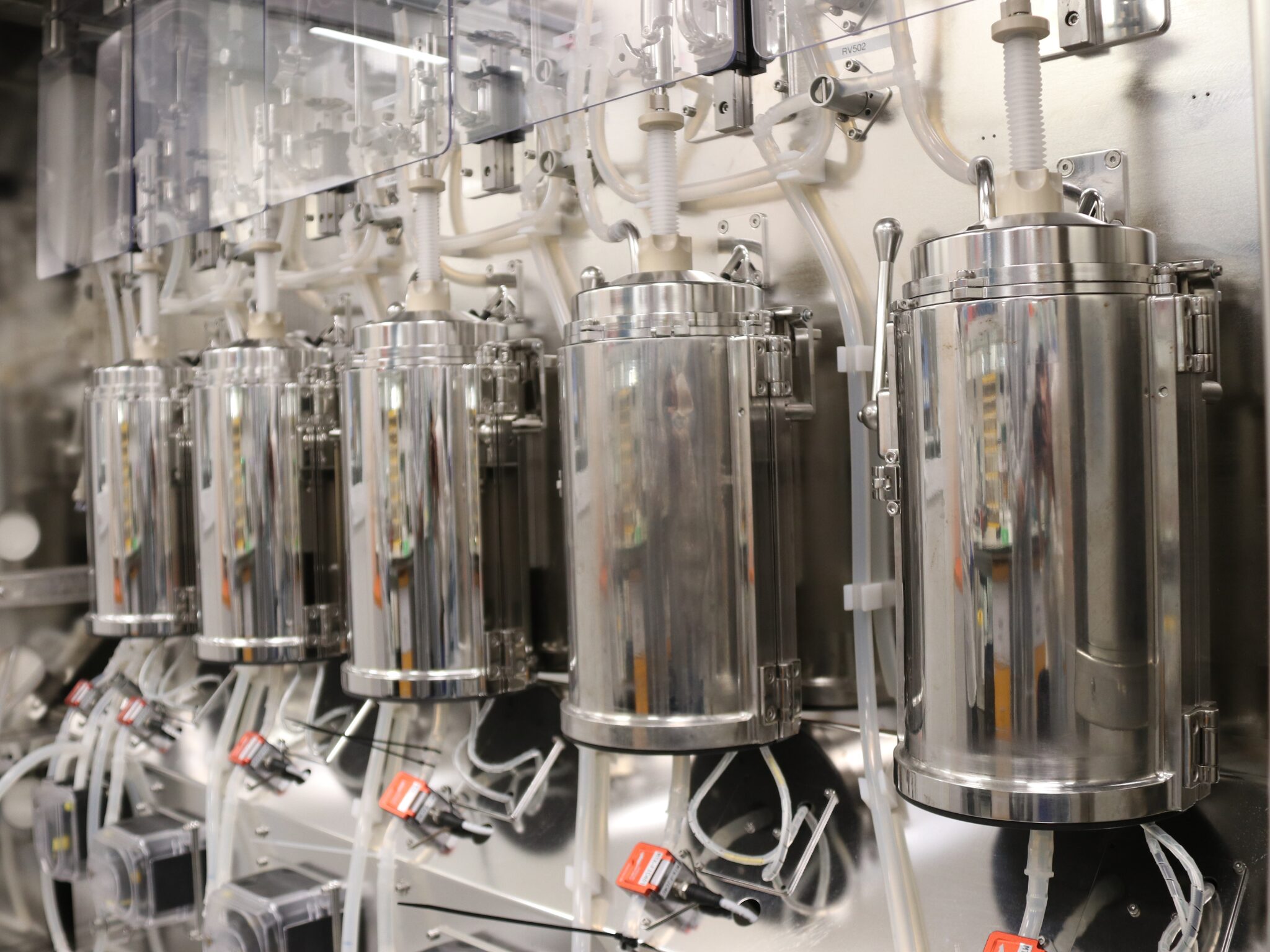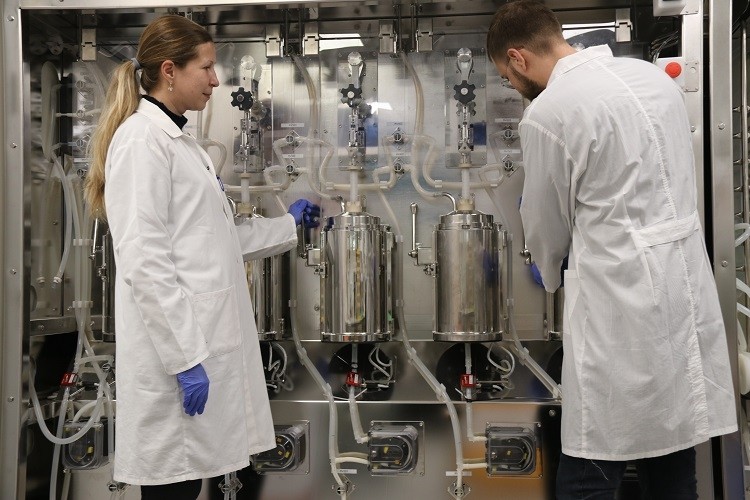You are using an out of date browser. It may not display this or other websites correctly.
You should upgrade or use an alternative browser.
You should upgrade or use an alternative browser.
FDA finally approves lab-grown meats
- Thread starter Charlie Hustle
- Start date
More options
Who Replied?
Ever After Foods Nabs $10M to Make Cultivated Meat 90% Cheaper
Ever After Foods has secured $10M for its bioreactor platform to let companies scale up cultivated meat production at 90% lower costs.
Ever After Foods Raises $10M for Scale-Up Platform That Make Cultivated Meat 90% Cheaper
CELL-BASED NEWS ALT PROTEIN FUTURE FOODSPublished on Jun 19, 2024 Last updated Jun 19, 2024
 Courtesy: Ever After Foods
Courtesy: Ever After Foods4 Mins Read
Israeli biotech firm Ever After Foods has secured $10M to accelerate the growth of its bioreactor platform that allows cultivated meat producers to scale up manufacturing while driving down costs.
Ever After Foods has received $10M from strategic investors in the EU and the US to support its scalability platform for cultivated meat, which offers a cost-effective and highly efficient manufacturing solution for producers.The funding round includes a second investment from Israeli cellular agriculture company Pluri and the Tnuva Group (the country’s largest food company), which formed Ever After Foods as a joint venture in 2022.
“The current investment round in Ever After Foods is led by new global partners, and includes Tnuva’s renewed commitment as well. We believe this validates Pluri’s strategy and underscores the quality of our technology and solutions,” said Pluri CEO and president Yaky Yanay.
Making more efficient cultivated meat at low costs

Formerly called Plurinuva, Ever After Foods has exclusive licencing rights to use Pluri’s technology and intellectual property to develop, manufacture and commercialise cultivated meat. It is starting with beef and poultry cells, but the latest investment has extended the licence to include seafood as well.
The startup launched its bioreactor platform last year, with the ability to produce 10kg of cultivated meat mass with just a 10-litre tank at the time. Since then, however, it says it has “swiftly advanced” its technology and manufacturing platform, demonstrating the natural production of muscle and fat tissues for various animal cells, hitting the taste and texture touchpoints so crucial to consumers.
This tech enables Ever After Foods to offer a 90% reduction in costs for its B2B clients, compared to “the second-best technology in the field”. Moreover, the bioreactors yield up to six times more protein and 700 times more lipids from each cell, offering better flavour and nutritional value.
The cell cultivation process is also much, much lighter on the planet than industrially raised livestock, boasting 93% less air pollution, 95% less land, and 94% less water.
“Ever After Foods’ unique and innovative production platform empowered the change to our business model. The shift to a technology enabler will allow us to serve more players in the value chain,” said Ever After Foods CEO Eyal Rosenthal.
“Securing funding from new global partners is a testament to our team’s tireless dedication to solving the primary production barriers for the next step toward a more sustainable meat industry. In addition to the funding, working with new partners in the space will deepen our industry network and speed up our expansion into international markets as we drive the next era of scalable cultivated meat production.”
Tackling the cost and scale hurdles

Scalability and costs are two of the most pressing challenges holding back the progress of the cultivated meat industry. One investor told Reuters that these products need to reach manufacturing costs of $2.92 per pound to be price-competitive with conventional meat. But while companies have managed to bring down these costs by 99% in less than a decade, analysis by McKinsey suggests it will still take until 2030 for these proteins to become as cheap as conventional meat.
This is a problem both locally and internationally. “Scaling up manufacturing for Israeli startups is challenging due to infrastructure costs, mirroring challenges encountered by startups worldwide,” Alla Voldman, VP of strategy and policy at industry think tank the Good Food Institute Israel, told Green Queen last month.
“Consequently, most new Israeli startups tend to focus more on business-to-business (B2B) solutions, aiming to fill these industry gaps and overcome scalability obstacles,” she added.
McKinsey further notes that cultivated meat companies would need over 17 times the fermentation capacity that currently exists in the global pharmaceutical industry to meet the growth demands of the industry. Responding to this need, in Israel, contract development and manufacturing organisations that have traditionally served pharmaceutical companies have now begun to expand to the cultivated meat sector.
To address the cost challenge, government agency the Israel Innovation Authority established a research consortium in 2022, comprising 14 companies and 10 academic labs equipped with an $18M investment to develop cost-effective methods to produce cultivated meat.
Israel is one of only three countries to approve the sale of cultivated meat, greenlighting local startup Aleph Farms‘ application in January. The country has made food tech one of its top five priority R&D areas, and attracted 10% of all VC funding ($1.2B) in the alternative protein sector in the last decade.
By 2030, the industry is expected to produce 10,000 additional jobs (a third of which would be manufacturing roles), have more than 200 companies and over a dozen manufacturing facilities, and contribute $2.5B to Israel’s economy through exports, local wages, corporate taxes, and more.
Eat test-tube-steak, brehs.


Cultivated Meat for $6 Per Pound? This New Study Shows It's Possible
A breakthrough study explores how continuous manufacturing can solve the scalability challenges of cultivated chicken and bring prices down to $6 per lb.
Cultivated Chicken for $6 Per Pound? This New Study Shows It’s Possible
Cell-Based NewsFuture FoodsResearch & Scientific Studies

By Anay Mridul
Published on Aug 22, 2024
Last updated Aug 22, 2024
 Courtesy: Believer Meats
Courtesy: Believer Meats 4 Mins Read
A breakthrough study explores how continuous manufacturing can solve the scalability challenges of cultivated chicken and bring prices down to $6 per lb.
If you speak to anybody from the cultivated meat sector – be it a startup founder, an investor, or a think tank expert – most of them will likely tell you that scalability and costs are the two biggest bottlenecks of the industry’s progress.As it stands, there’s simply not enough infrastructure to make cultivated meat in batches that will drive costs closer to conventional meat. According to McKinsey, startups in this space would need over 17 times the fermentation capacity that currently exists in the global pharmaceutical industry to meet the growth demands of the industry.
The consulting giant further states that it’ll take until at least 2030 for these proteins to reach price parity, and this is despite companies having brought down costs by 99% in less than a decade. One investor told Reuters that these products need to reach manufacturing costs of $2.92 per pound to be price-competitive with conventional meat.
Now, a new study by Israel’s Believer Meats and the Hebrew University of Jerusalem (HUJI) demonstrates how cultivated meat can be produced in a manner that is cost-effective, describing it as a potential “breakthrough” for the industry.
Published in the Nature Food journal, the research is based on a technology called tangential flow filtration (TFF) – an efficient way to separate and purify biomolecules – for the continuous manufacturing of cultivated meat. It can potentially bring down the cost of producing cultivated chicken to $6.20 per pound, in line with the retail price of conventional organic chicken.
For context, the only cultivated meat currently found in supermarkets, Good Meat’s chicken, has a retail price equivalent to over $20 per pound – and cultivated cells only make up 3% of the product.
Empirical study paves the way for accessible cultivated meat

Courtesy: Nahmias Lab
Believer Meats founder Yaakov Nahmias and researchers from HUJI took inspiration from how Ford’s automated assembly line transformed the auto industry in the early 20th century.
They leveraged a new bioreactor assembly method (enabled by the TFF technique) to allow biomass expansion of 130 billion cells per litre, with a yield of 43% weight per volume. This process of cultivated the chicken cells was carried out continuously for over 20 days, leading to daily harvests of the biomass.
The study also introduced an animal-free culture medium that cost only $0.63 per litre, supporting the long-term, high-density culture of chicken cells. Culture media represent the bulk of the costs of cultivated meat production, and can cost hundreds of dollars.
Using this empirical data, the researchers conducted a techno-economic analysis of a hypothetical 50,000-litre production facility, which resulted in the aforementioned $6.20 per lb figure for cultivated chicken.
“Empirical data is the bedrock for any cost model of scaled cultivated meat production, and this study is the first to provide real-world empirical evidence for key factors that influence the cost of production, such as media cost, metabolic efficiency, and achievable yields in a scalable bioprocess design,” said Elliot Swartz, principal cultivated meat scientist at alternative protein think tank the Good Food Institute.
“Our findings show that continuous manufacturing enables cultivated meat production at a fraction of current costs, without resorting to genetic modification or mega-factories,” said Nahmias. “This technology brings us closer to making cultivated meat a viable and sustainable alternative to traditional animal farming.”
Cost-cutting efforts are front of mind for cultivated meat producers

Courtesy: Believer Meats
The study’s authors acknowledged that various other factors would affect the final price of cultivated meat, but added that their research underscored the potential of continuous manufacturing to slash production costs and make these proteins more accessible to consumers.
The research has also presented solutions like a novel filter stack perfusion that can reduce factory costs, aside from the animal-free medium that can lower raw material costs and the continuous manufacturing that increases factory capacity. The analysis of the 50,000-litre facility resulted in a projected annual production of 2.14 million kg of cultivated chicken at price parity with USDA Organic chicken.
Many companies have been making efforts to decrease the cost of culture media, including pet food producers Meatly and BioCraft Pet Nutrition. The former has created a protein-free medium to get costs to just £1 ($1.30), while the latter has developed a plant-based medium that could bring market prices down to $2-2.50 per lb.
“This important study provides numerous data points that demonstrate the economic feasibility of cultivated meat. The study confirms early theoretical calculations that serum-free media can be produced at costs well below $1/L without forfeiting productivity, which is a key factor for cultivated meat achieving cost-competitiveness.”
Fellow Israeli company Ever After Foods has also developed a bioreactor platform that offers a 90% reduction in cultivated meat prices for its B2B clients. And researchers in Finland have posited stem cell metabolism as a way to produce these proteins without expensive growth factors.
Believer Meats, meanwhile, is currently building what it claims would be the world’s largest cultivated meat facility. Located in North Carolina, the 200,000 sq ft plant would be able to churn out at least 10,000 tonnes of product a year, and will help apply this continuous manufacturing research in practice on a large scale.

Gov. Pillen targets ‘fake meat’ in new executive order, seeks total ban on sales in 2025 • Nebraska Examiner
Gov. Jim Pillen announced new regulations and future legislation to crackdown on "fake" or "lab-grown" meat.
 nebraskaexaminer.com
nebraskaexaminer.com
Gov. Pillen targets ‘fake meat’ in new executive order, seeks total ban on sales in 2025
‘We’re being proactive and making sure that silly things aren’t happening, because they are happening on the Coasts,’ Pillen says
By:

Gov. Jim Pillen, center, hosts a news conference at Oak Barn Beef in West Point announcing new regulations and future legislation to crackdown on “fake” or “lab-grown” meat in Nebraska on Thursday, Aug. 29, 2024. Behind him are, from left: Hannah Klitz, co-owner and co-operator of the family led Oak Barn Beef; Jeanne Reigle of Madison, a livestock producer and 2024 legislative candidate; and Director Sherry Vinton of the Nebraska Department of Agriculture. (Zach Wendling/Nebraska Examiner)
WEST POINT, Nebraska — Gov. Jim Pillen and the Nebraska Department of Agriculture announced new regulations Thursday against “lab-grown meat” or “fake meat,” with Pillen eyeing 2025 legislation to prohibit the sale of such products within the state.
On top of new regulations, standards and the potential legislation, Pillen signed an executive order Thursday that prohibits state agencies from procuring lab-grown or other meat alternatives. The order also requires entities that contract with the State of Nebraska to promise not to discriminate against natural products in favor of laboratory or cultivated meat producers.
“We’re being proactive and making sure that silly things aren’t happening, because they are happening on the Coasts,” Pillen said, speaking at Oak Barn Beef, a local family beef operation. “If we sit back and wait until the grocery stores are full, that’s not the way we want to lead.”
Labeling regulations

Director Sherry Vinton of the Nebraska Department of Agriculture at a news conference in West Point. Aug. 29, 2024. (Zach Wendling/Nebraska Examiner)
Nebraska Agriculture Director Sherry Vinton said her agency will be launching new labeling regulations “simply to protect consumers from being misled.”
Similar to recent regulations in Iowa, manufactured protein or lab-grown meat would be required to be clearly and distinctly separated from “natural, real meat” under the future regulations and be labeled as such with a conspicuous and prominent label, Vinton said.
Standards will also be developed to determine when manufactured food, cell-grown or lab-grown meat is being falsely advertised or misbranded, she said.
Pillen’s family owns a major hog operation in Nebraska. He and University of Nebraska-Lincoln officials have highlighted that the livestock industry contributes more than $6 billion to the state’s economy each year.
Banning ‘fake meat’ sales

Nebraska Gov. Jim Pillen (left) joins Attorney General Mike Hilgers at a news conference. May 13, 2024. (Zach Wendling/Nebraska Examiner)
In May, Florida and Alabama became the first states to outlaw the sale of meat alternatives, and Pillen seeks to hold true to a promise he made that month that Nebraska would join the list.
When Nebraska sued California and the federal government over new emissions rules in May, Pillen said the Cornhusker State can “play that game, too,” when it comes to state regulations.
“The fake-meat, petri-dish-meat folks, they’re not going to have a place in Nebraska, just mark that down on your calendar,” Pillen told reporters May 13. “It’s time for us to roll up our sleeves and fight and defend Nebraska, and that’s what we’re doing.”
Pillen said Thursday he will ask lawmakers to propose and prioritize such legislation.
“We can etch it in stone so nobody has a chance,” Pillen said. “If there are Nebraskans that want to buy lab-grown meat, good for them, they’re just not going to do it in Nebraska.”
‘Putting us out of business’

Jeanne Reigle of Madison, a livestock producer and 2024 legislative candidate, joins Gov. Jim Pillen for a news conference in West Point. Aug. 29, 2024. (Zach Wendling/Nebraska Examiner)
Jeanne Reigle, a livestock producer southeast of Madison, and a 2024 legislative candidate, also spoke at Thursday’s news conference. She said that, like Pillen, she has been “very appalled about the so-called ‘smart people’ that think they know more than we know, who’ve been doing this for generations in the ag industry.”
She pointed to three common arguments in favor of meat alternatives: less greenhouse gas emissions, the absence of pathogens and lack of cruelty to animals.
Reigle said the ag producers take care to prevent greenhouse gas emissions, pathogens and animal cruelty. She also said that the energy it takes to run bioreactors producing such alternatives “probably” far outweighs gas emissions in traditional ag, that there are “several failure points” in the lab to introduce bacteria and that the proponents haven’t seen the true cruelty-free process producers utilize in Nebraska.
The only way that “fake meat” will go from a niche market to a mass market, Reigle said, is if the government subsidizes the process. She said that would mean “putting us out of business.”
“With that in mind, the thing that keeps me up at night and scares me thinking about the future of our children, our grandchildren, is that the government could get involved and have more control over this new so-called ‘food,’” Reigle said.
Order heads to secretary of state

Gov. Jim Pillen holds up a newly signed executive order to crackdown on “fake” or “lab-grown” meat within Nebraska agencies and contractors with the State of Nebraska in West Point. Aug. 29, 2024. (Zach Wendling/Nebraska Examiner)
The governor directed much of his criticism, as he has in the past, on Bill Gates and other people from “the Coasts” who have advocated for alternative meats.
“There’s a guy that made some money in building computers,” Pillen said, pointing to Bill Gates. “He needs to stay in the computer space and knock this stuff off thinking that he’s going to promote lab-grown meat. He’s lost his brains.”
Pillen described the new efforts as “a big deal” as Nebraska enters “a full-blown attack on lab-grown meats and fake meat.” He campaigned on the promise to tackle fake meat and dairy in 2022 and said Thursday he should have embraced the changes on his “second day.”
Secretary of State Bob Evnen received and signed the executive order Thursday afternoon, so it took effect right away.
Similar threads
- Replies
- 14
- Views
- 609
